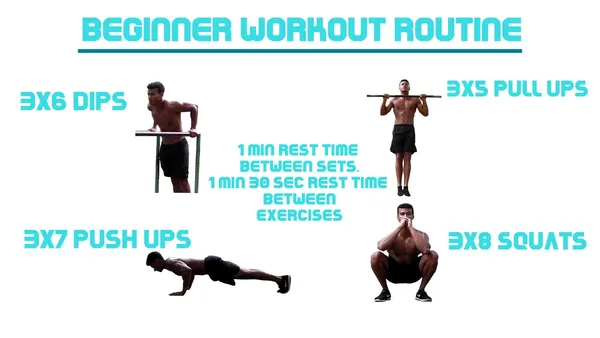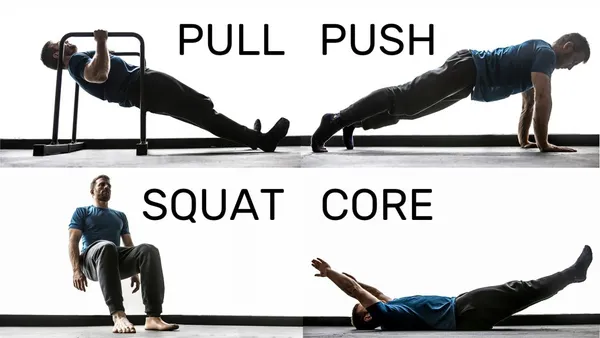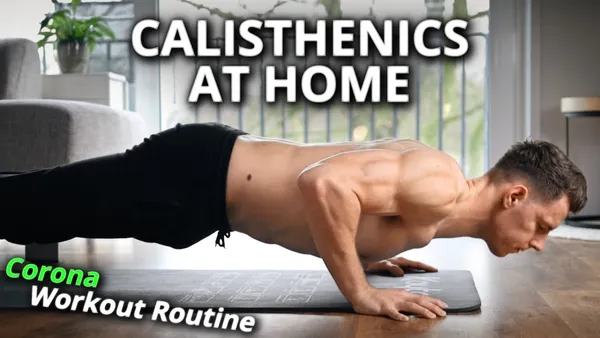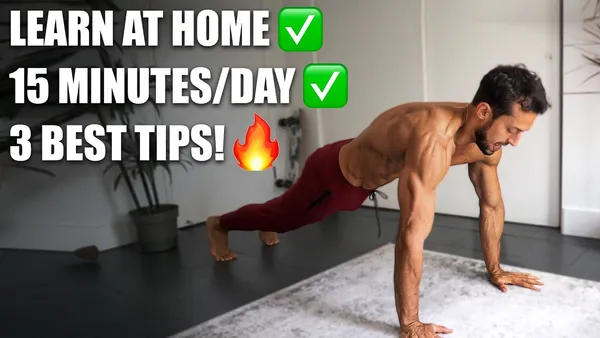Table of Contents
Have you ever thought about getting in shape but didn't know where to start? Calisthenics is a great way to get in shape at home without any equipment. It's a form of exercise that uses your own body weight to build strength, flexibility, and endurance. If you're new to calisthenics, don't worry! Getting started is easy. In this article, we'll give you a step-by-step guide on how to start calisthenics at home, even if you're a complete beginner. So what are you waiting for? Let's get started!
Topic | Key Takeaway |
|---|---|
Benefits of Calisthenics | Improved strength, flexibility, endurance, and coordination |
Getting Started | Start with basic exercises, gradually increase intensity and frequency |
Essential Exercises | Push-ups, squats, lunges, rows, planks |
Workout Plan | Create a plan that includes warm-up, exercises, and cool-down |
Nutrition and Recovery | Consume a balanced diet, hydrate well, and get enough rest |
Staying Motivated | Set realistic goals, find a workout buddy, and track progress |
Common Mistakes | Overtraining, improper form, neglecting nutrition |
Advanced Exercises | Muscle-ups, handstands, planche |
I. Master the Art of Calisthenics at Home: A Comprehensive Guide
Calisthenics: A Path to Fitness and Empowerment
Calisthenics, the art of bodyweight training, offers a transformative path to fitness and empowerment. Embark on this journey to unlock your physical potential, enhance your well-being, and discover the joy of movement. Whether you're a seasoned athlete or just starting your fitness journey, calisthenics empowers you to achieve your goals and embrace a healthier, more fulfilling lifestyle.
Benefits of Calisthenics: A Multitude of Rewards
The benefits of calisthenics extend far beyond aesthetics, encompassing a wide range of physical and mental enhancements. Engage in this versatile form of exercise to:- Enhance strength, flexibility, endurance, and coordination- Improve cardiovascular health and boost energy levels- Build lean muscle mass and reduce body fat- Increase bone density and reduce the risk of osteoporosis- Improve posture and reduce back pain- Enhance mood, reduce stress, and promote better sleepDiscover the myriad benefits of calisthenics and embark on a journey of physical and mental transformation.
Benefit | Description |
|---|---|
Improved strength | Calisthenics exercises engage multiple muscle groups, leading to increased strength and power. |
Enhanced flexibility | Calisthenics movements promote flexibility and range of motion, reducing the risk of injuries. |
Increased endurance | Calisthenics workouts challenge your cardiovascular system, improving endurance and stamina. |
Master the Art of Calisthenics at Home: A Comprehensive Guide
II. Beginner's Blueprint: Getting Started with Calisthenics at Home
1. Master the Basics: Embarking on Your Calisthenics Journey
Embarking on the path of calisthenics at home requires a solid foundation in its fundamental movements. Begin with mastering bodyweight exercises such as push-ups, squats, lunges, and planks. These exercises engage multiple muscle groups, improving overall strength and stability. As you progress, gradually increase the intensity and frequency of your workouts to challenge your body and witness steady growth.
2. Consistency and Discipline: The Pillars of Calisthenics Success
Consistency is paramount in calisthenics. Dedicate yourself to regular training sessions, even when motivation wanes. Set realistic goals and create a workout plan that aligns with your schedule. Discipline plays a crucial role in achieving your fitness aspirations. Push past the initial discomfort and embrace the transformative power of calisthenics.
3. Listen to Your Body: A Harmonious Approach
As you embark on your calisthenics journey, it's essential to listen to your body and respect its limits. Rest when necessary, and don't push yourself beyond your capabilities. This holistic approach fosters sustainability and prevents burnout. Remember, progress is not linear; there will be setbacks along the way. Embrace the challenges, learn from them, and continue striving towards your fitness goals.
Calisthenics Exercise | Benefits |
|---|---|
Push-ups | Strengthens chest, triceps, and shoulders |
Squats | Develops leg strength and mobility |
Lunges | Enhances hip stability and quadriceps strength |
Planks | Improves core stability and posture |
Related: Calisthenics vs. Gymnastics: Unveiling the Distinctions
Beginner's Blueprint: Getting Started with Calisthenics at Home
III. Essential Exercises for Calisthenics Success: Building a Strong Foundation
Calisthenics is a great way to get in shape, and it doesn't require any special equipment. You can do calisthenics exercises anywhere, anytime. But if you're new to calisthenics, it's important to start with the basics. These essential exercises will help you build a strong foundation and prepare you for more advanced moves.
One of the most important calisthenics exercises is the push-up. Push-ups work your chest, shoulders, triceps, and core. To do a push-up, start in a plank position with your hands shoulder-width apart. Lower your chest towards the ground by bending your elbows, then push back up to the starting position. If you're new to push-ups, you can start by doing them on your knees.
Another essential calisthenics exercise is the squat. Squats work your legs, glutes, and core. To do a squat, stand with your feet shoulder-width apart. Lower your body by bending your knees and hips, as if you're sitting back into a chair. Keep your chest up and your knees behind your toes. Return to the starting position by extending your knees and hips.
Lunges are another great calisthenics exercise for your legs and glutes. To do a lunge, step forward with one leg and bend your knee so that your thigh is parallel to the ground. Keep your other leg straight and your heel on the ground. Push off with your front foot to return to the starting position. Repeat with the other leg.
Rows are a great way to work your back and biceps. To do a row, stand with your feet shoulder-width apart and hold a weight in each hand. Bend over at the waist and let the weights hang down. Pull the weights up to your chest, then slowly lower them back down.
Planks are a great way to work your core. To do a plank, start in a push-up position with your forearms on the ground and your elbows under your shoulders. Hold this position for as long as you can.
Exercise | Muscles Worked |
|---|---|
Push-ups | Chest, shoulders, triceps, core |
Squats | Legs, glutes, core |
Lunges | Legs, glutes |
Rows | Back, biceps |
Planks | Core |
These are just a few of the essential calisthenics exercises that you can do to build a strong foundation. Once you've mastered these exercises, you can start to add more advanced moves to your routine.
Here are some tips for getting started with calisthenics:
- Start slowly and gradually increase the intensity and frequency of your workouts.
- Listen to your body and rest when you need to.
- Find a workout buddy to help you stay motivated.
- Have fun! Calisthenics is a great way to get in shape and improve your overall health.
If you're looking for a great way to get in shape, calisthenics is a great option. It's a challenging but rewarding form of exercise that can help you build strength, flexibility, and endurance. So what are you waiting for? Get started today!
Here are some related posts that you may find helpful:
- How to Get Started with Calisthenics as a Beginner
- The Best Calisthenics Exercises and Variations
- How to Design Your Own Calisthenics Routine and Program
Essential Exercises for Calisthenics Success: Building a Strong Foundation
IV. Progressive Overload and Calisthenics Mastery: Unlocking Your True Potential
The Principle of Progressive Overload
Progressive overload is a fundamental principle in calisthenics that involves gradually increasing the demands on your body over time. By consistently challenging yourself with more difficult exercises, higher repetitions, or longer sets, you force your muscles to adapt and grow stronger. This process is essential for continuous progress and unlocking your true potential in calisthenics.
Implementing Progressive Overload in Your Training
To effectively implement progressive overload in your calisthenics training, follow these steps:
- Start with a solid foundation: Begin with basic exercises and gradually increase the difficulty as you gain strength and skill.
- Increase intensity: Gradually increase the number of repetitions, sets, or weight used in your exercises.
- Challenge yourself: Regularly attempt more advanced exercises or variations to push your limits.
- Listen to your body: Rest and recovery are crucial for progress. Avoid overtraining and allow your body to adapt to the increased demands.
Benefits of Progressive Overload
Progressive overload offers numerous benefits for calisthenics practitioners, including:
- Increased muscle strength and endurance
- Improved body composition and aesthetics
- Enhanced athletic performance
- Reduced risk of injuries
- Boosted confidence and motivation
Related Posts:
- How to Build Muscle and Strength with Calisthenics
- The Best Calisthenics Exercises and Variations
- How to Design Your Own Calisthenics Routine and Program
Exercise | Difficulty | Benefits |
|---|---|---|
Push-ups | Beginner | Strengthens chest, triceps, and shoulders |
Squats | Beginner | Strengthens legs, glutes, and core |
Lunges | Intermediate | Strengthens legs, glutes, and improves balance |
Rows | Intermediate | Strengthens back, biceps, and shoulders |
Planks | Beginner | Strengthens core, improves posture, and stability |
Progressive Overload and Calisthenics Mastery: Unlocking Your True Potential
V. Conclusion
Congratulations on taking the first step towards starting calisthenics at home! Remember, consistency is key. Set realistic goals, listen to your body, and don't be afraid to challenge yourself as you progress. With dedication and perseverance, you'll be amazed at how much you can achieve. If you ever feel stuck or need guidance, don't hesitate to seek support from online communities, fitness professionals, or resources like Kizworld. Together, let's unlock your fitness potential and embark on a journey of strength, flexibility, and overall well-being through calisthenics.